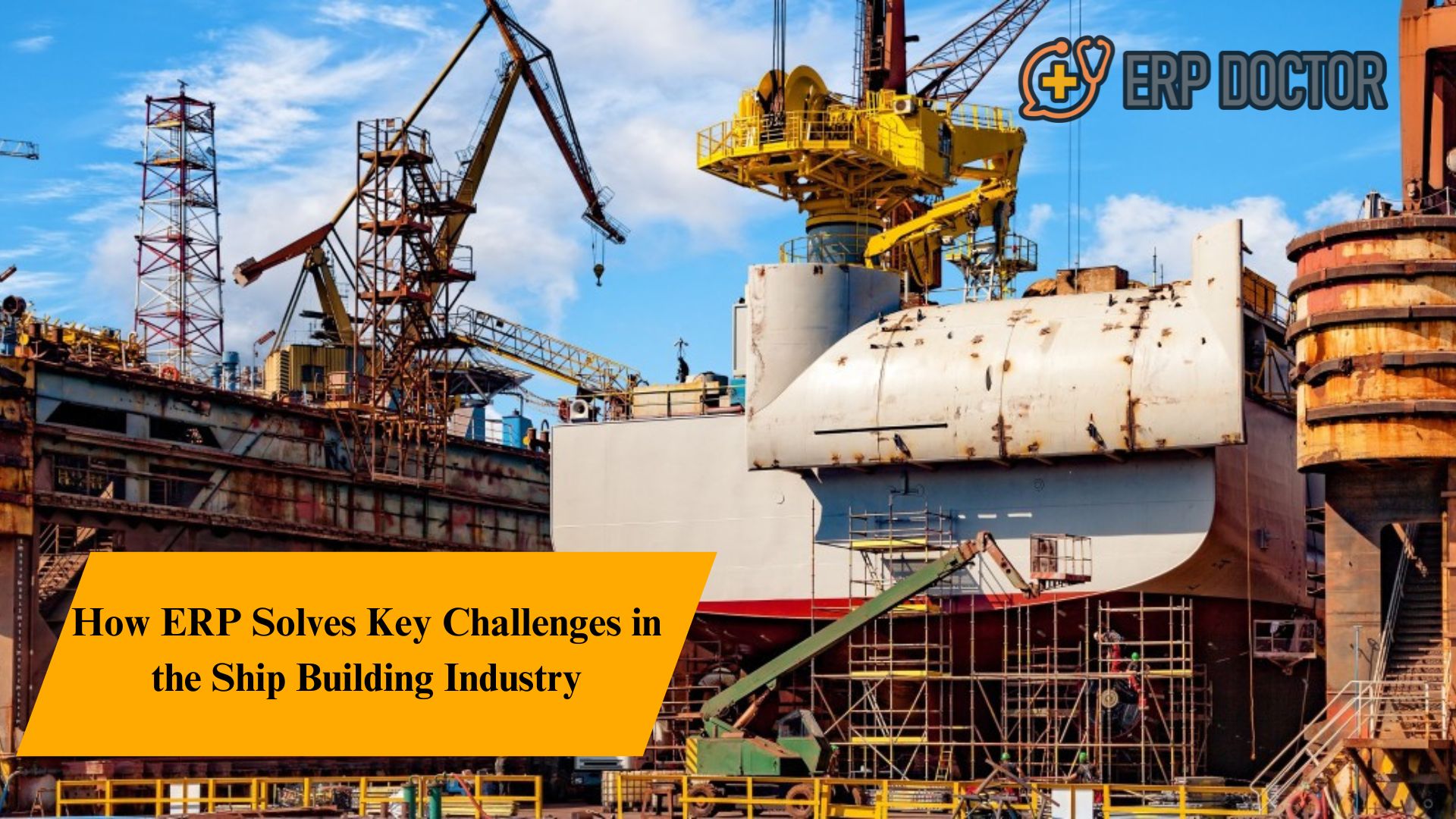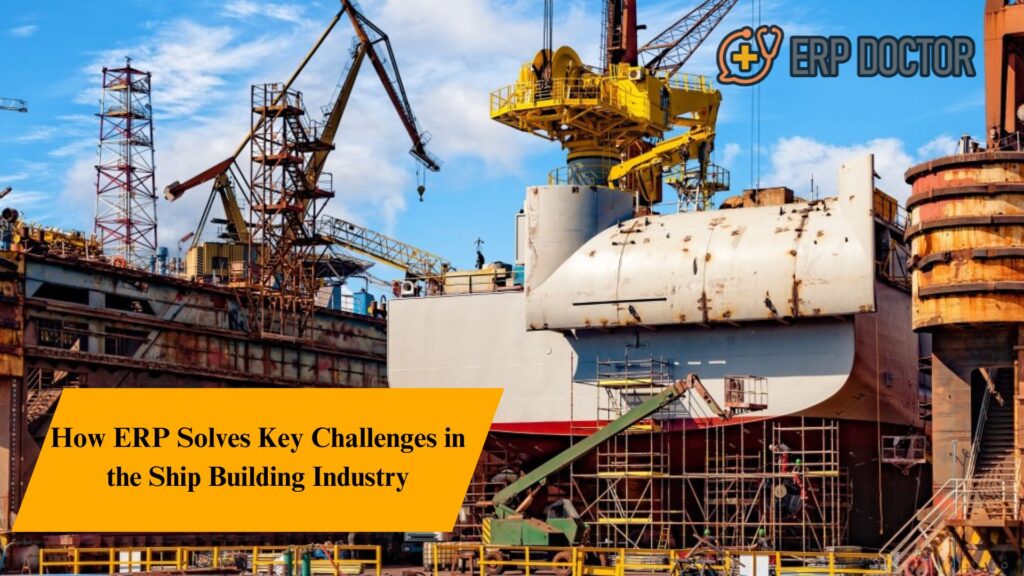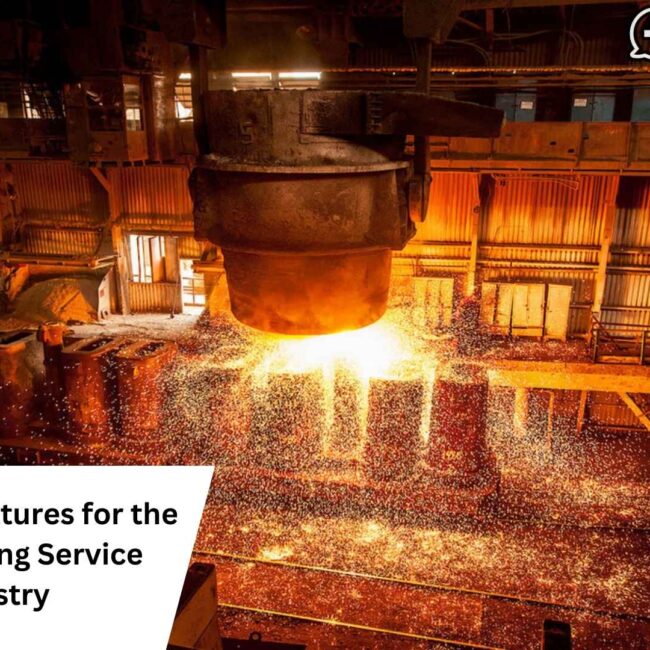
How ERP Solves Key Challenges in the Ship Building Industry

Future-Proofing the Ship Building Industry with ERP: A Guide to Smarter Operations
The Ship Building Industry relies on ERP (Enterprise Resource Planning) systems to streamline engineering, procurement, and production processes. Managing large-scale projects, strict compliance regulations, and supply chain disruptions are just a few of the challenges faced by shipbuilders worldwide. ERP offers a comprehensive solution to optimize resources, enhance project execution, and improve overall efficiency.
Key Challenges in the Ship Building Industry
- Complex Project Management – Building a ship involves multiple stakeholders, each responsible for different aspects of the project. Delays and mismanagement can lead to cost overruns.
- Supply Chain Disruptions – Shipbuilding requires numerous raw materials and environmental regulations.
- Cost Overruns – Inefficient resource allocation and unexpected delays can lead to increased project costs.
- Workforce Management – Shipbuilding requires a skilled workforce, and managing labor, wages, and productivity is crucial.
- Integration of Engineering & Manufacturing – Coordinating design modifications with production schedules is a major challenge.
How ERP Transforms the Ship Building Industry
An ERP system integrates all business processes into a single platform, ensuring efficiency and control across various functions. Here’s how ERP solves key challenges in the Ship Building Industry:
1. Improved Project Management
With ERP, shipbuilders can monitor every stage of construction, track milestones, and allocate resources effectively, reducing delays and enhancing project execution.
2. Enhanced Supply Chain Management
ERP software enables real-time tracking of raw materials, procurement planning, and supplier management, reducing the risk of disruptions and shortages.
3. Regulatory Compliance and Reporting
Compliance with international maritime regulations is made easier with ERP, as it automates documentation, audits, and reporting for regulatory authorities.
4. Cost Control & Budgeting
ERP provides real-time visibility into financial data, allowing shipbuilders to control project costs, forecast expenses, and prevent budget overruns.
5. Workforce Optimization
By automating payroll, attendance, and labor allocation, ERP software helps streamline workforce management, ensuring compliance with labor laws.
6. Seamless Engineering & Manufacturing Integration
ERP solutions bridge the gap between CAD design software and production processes, ensuring that engineering changes are updated in real-time, preventing errors.
7. Better Maintenance & Lifecycle Management
Ship maintenance and after-sales service are streamlined with ERP, allowing manufacturers to schedule routine maintenance and reduce downtime.
8. Data-Driven Decision Making
ERP systems provide shipbuilders with actionable insights through real-time analytics, helping them make strategic decisions faster.
The Ultimate ERP Solution for the Ship Building Industry
SAP B1 is a powerful ERP solution designed to meet the unique needs of the Ship Building Industry, enabling seamless integration of business functions, enhanced resource planning, and improved operational efficiency. The Ship Building Industry faces challenges such as complex supply chains, compliance requirements, and cost control, making ERP software a crucial tool for success.
With SAP Business One, shipbuilders can streamline processes, reduce risks, and manage projects effectively. This integrated solution ensures regulatory compliance, optimizes inventory management, and enhances financial control. By leveraging SAP B1, shipbuilding companies can stay ahead in a competitive market while achieving long-term growth and efficiency.
Frequently Asked Questions (FAQs)
1. How does ERP help in shipbuilding project management?
ERP provides real-time tracking of project milestones, resource allocation, and task management, ensuring efficient execution.
2. Can ERP integrate with design software used in shipbuilding?
Yes, ERP systems can integrate with CAD and other design tools to streamline engineering and manufacturing processes.
3. What are the cost benefits of implementing ERP in the ship building industry?
ERP minimizes cost overruns by providing better budget control, financial forecasting, and automated resource planning.
4. How does ERP improve supply chain management in shipbuilding?
It enables real-time inventory tracking, supplier collaboration, and demand forecasting, reducing supply chain disruptions.
5. Is ERP beneficial for regulatory compliance in shipbuilding?
Yes, ERP software automates compliance reporting, documentation, and audits, ensuring adherence to maritime regulations.
6. Can ERP enhance workforce management in the ship building industry?
Absolutely! ERP systems automate payroll, shift scheduling, and labor law compliance, improving workforce efficiency.
7. Does ERP help in ship maintenance and lifecycle management?
Yes, ERP streamlines maintenance schedules, service management, and spare parts tracking, reducing downtime.
8. What features should shipbuilding companies look for in an ERP system?
Key features include project management, supply chain integration, compliance automation, and real-time analytics.
9. How long does it take to implement an ERP system in the ship building industry?
Implementation timelines vary based on business needs, but it typically takes several months for full deployment.
10. Can small and medium-sized shipbuilders benefit from ERP software?
Yes, modern ERP solutions are scalable and can be tailored to fit the needs of small and medium-sized enterprises (SMEs) in shipbuilding.



